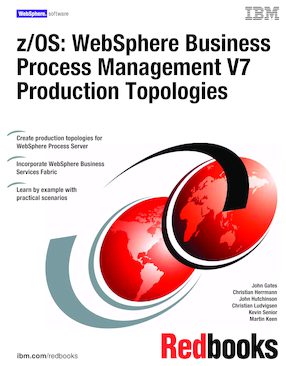z/OS: WebSphere Business Process Management V7 Production Topologies
An IBM Redbooks publication
Note: This is publication is now archived. For reference only.

Published on 07 June 2010
ISBN-10: 0738434353
ISBN-13: 9780738434353
IBM Form #: SG24-7831-00
Authors: Martin Keen, John Gates, Christian Herrmann, John Hutchinson, Christian Ludvigsen and Kevin Senior
In this IBM® Redbooks® publication, we address the configuration, administration, and security of the key runtime environments in business process management: WebSphere® Process Server V7.0 and WebSphere Business Services Fabric V7.0 for z/OS®. This book provides detailed guidance to z/OS system and database administrators who want to configure WebSphere Business Process Management production topologies.
We introduce production topology concepts and terminology and explore the differences between production topologies on distributed platforms and z/OS. Through a series of step-by-step instructions, you will learn how to create and verify a production topology environment for WebSphere Process Server V7 for z/OS.
We extend the production topology concept for WebSphere Process Server by describing step-by-step how to add WebSphere Business Services Fabric V7 for z/OS into the topology. You also get problem diagnosis and prevention guidance to use when you create your own production topologies.
A separate publication that covers distributed platforms is also available: "WebSphere Business Process Management V7 Production Topologies," SG24-7854.
Chapter 1. Business Process Management production topologies for z/OS
Chapter 2. Planning for and preparing WebSphere Process Server
Chapter 3. Creating the WebSphere Process Server deployment manager and two empty nodes
Chapter 4. Configuring the database resources
Chapter 5. Configuring the WebSphere Process Server cluster
Chapter 6. Verifying the configuration
Chapter 7. Adding WebSphere Business Services Fabric for z/OS to an existing z/OS cell
Chapter 8. Problem determination and prevention
Appendix A. Additional material